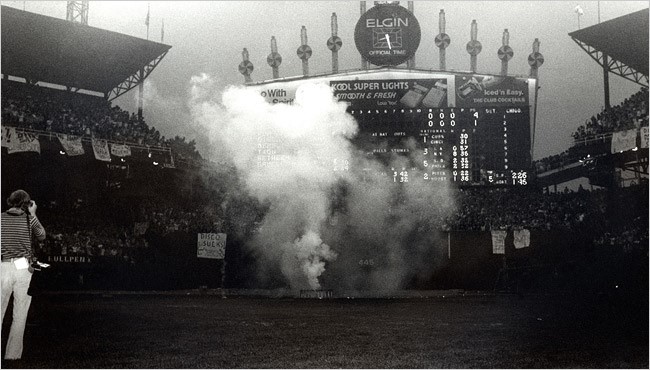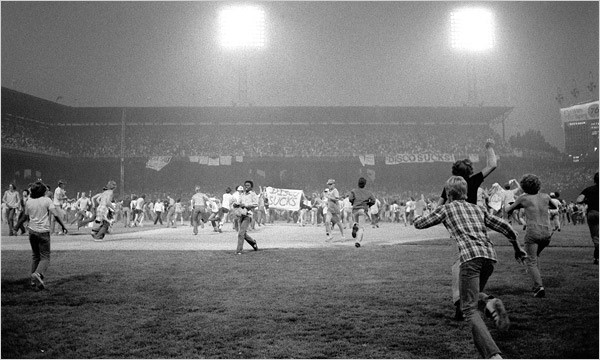Baseball’s Worst Marketing Promotions Ever – Part III
In the last few weeks we’ve covered some of baseball’s more infamous attempts to attract fans out to the ballpark. We’ve talked about bad mascots and promotions that have resulted in the home team forfeiting the game. The last promotion covered was Cleveland’s Ten Cent Beer Night in the 1970s and I have to say that I really had a tough time deciding which should be the worst of them all. But when your home field literally is set on fire; well, I think we have to crown Disco Demolition Night as baseballs worst marketing promotion for Major League Baseball.
In July, 1979 the Chicago White Sox held Disco Demolition Night as a promotion to attract fans out to old Comiskey Park. In those years, the White-Sox were owned by Bill Veek. Veek was a marketing guru for baseball and is regarded as one of the true pioneers for improving fan experience.
After purchasing the White Sox in 1959, Veek set about promoting a carnival atmosphere in addition to the game. The bottom line; Veek wanted fans to enjoy themselves. He upgraded Comiskey Park with the first “exploding scoreboard” in the major leagues – producing electrical and sound effects, and shooting fireworks whenever the White Sox hit a home run, and began adding players’ names on the back of their uniform, a practice now standard by most clubs in baseball. He also ran numerous promotions and was quoted to say “you can draw more people with a losing team plus bread and circuses than with a losing team and a long, still silence”. Perhaps his legacy is best described by one baseball historian who said “Bill Veek was to baseball what P.T. Barnum was to the circus.”
By 1979 his son Mike Veek had followed in his father’s footsteps and was eager to prove himself in the marketing arena. Mike would soon find an event that would distinguish him like no other.
Disco and the Backlash
Disco music had been on the rise since the early part of the 1970s and ushered in an era that was illustrated by movies such as Saturday Night Fever starring John Travolta. Disco clubs were everywhere and artists such as the Bee Gees saw their material move to the top of the charts. Despite its popularity, there were many who saw disco as a threat to rock music and some radio disc jockeys took advantage of that sentiment.
One of them was Steve Dahl of WLUP (aka “The Loop) in Chicago. Dahl was vehemently anti-disco and staged events on his daily show to show just how much he despised the music to the delight of his listeners. Antics included scratching to death of disco records and even protesting outside of disco-tech clubs. Mike Veek believed he could harness Dahl’s persona for an event and Dahl saw an opportunity to raise his standing in the anti-disco community.
Leading up to the Event
Mike Veeck, discussed the possibility of an anti-disco night promotion after he was of told of Dahl’s plans to blow up a crate of disco records on the air from a shopping mall. Dahl was interested and the promotion was that any fan who brought a disco record would be admitted to the park for only 98 cents (a reference to WLUP’s 97.9 radio frequency). The plan would be for Dahl to blow up the records during the middle of a double header against the Detroit Tigers on July 12, 1979. In the weeks prior to the event, Dahl encouraged his listeners to attend the game while Veek worked out the particulars. Neither man really believed that the event would produce much fanfare. Dahl was worried that it would be a disaster and he would end up humiliated. Estimates put the anticipated attendance at around 20,000 that evening which was about half the capacity of Comiskey Park.
Disco Demolition Night
On the day of the game, the fan response was overwhelming. Tickets quickly sold out leaving thousands outside of the ballpark. To try and distract any other fans from attending, the Chicago Police closed portions of the Dan Ryan Expressway around the area. For those fans who were unable to attend legally, they soon found their way into the ball park. Fans leapt turnstiles, climbed fences, and entered through open windows. As the first game began at 6pm , Mike Veeck got word about the situation and sent his security personnel to the stadium gates to keep the would-be gate crashers at bay. Unfortunately this meant that few security personnel were left to watch the field. Veek had also ordered gates to be locked which also meant that fans who thought things were getting out of hand could only leave by one exit turning the park into human grid-lock
For a park that only help 44,000; some estimates put the number of fans inside at close to 60,000. And players began to take note, that this was not the usual baseball crowd. “That wasn’t cigarette smoke out there tonight,” said one White Sox outfielder. Attendees threw firecrackers, empty liquor bottles, and lighters onto the field. The game was stopped several times because of the rain of foreign objects. Dozens of hand-painted banners with such captions such as “Disco sucks” were hung from the ballpark’s seating decks. White Sox broadcaster Harry Caray could see groups of people, who were clearly music rather than baseball fans, wandering through the stadium. Others sat intently in their seats, awaiting the explosion.
To compound matters, the bins that fans were supposed to deposit their records in for collection in soon overflowed due to the underestimated crowd; so many fans were content throwing them onto the field like Frisbees.
“They would slice around you and stick in the ground,” Tigers’ Players Representative Rusty Staub said. “It wasn’t just one, it was many. Oh, God almighty, I’ve never seen anything so dangerous in my life. I begged the guys to put on their batting helmets.”
The Tigers won the first game 4-1. And soon “all hell broke loose.”
The Explosion
Steve Dahl was never more in his element. Dressed in Army fatigues and parading around the park in an old jeep, Dahl stood like a conquering general to the delight of his masses. He then proceeded to center field where an enormous box filled with disco records was set to explode. After leading the crowd in an enormous chat of “Disco Sucks!”; Dahl then over the PA system told the crowd,
“This is now officially the world’s largest anti-disco rally! Now listen—we took all the disco records you brought tonight, we got ’em in a giant box, and we’re gonna blow ’em up reeeeeeal goooood”
On the mound, White Sox pitcher Ken Kravec, scheduled to start the second game, began to warm up. Other White Sox player, in the dugout and wearing batting helmets, looked out upon the scene.
Dahl set off the explosives, destroying the records and tearing a large hole in the outfield grass that was left smoldering

Immediately, the first of what would be thousands of attendees rushed onto the field, causing Kravec to flee the mound and join his teammates in a barricaded clubhouse. Between 5,000 and 7,000 people are estimated to have taken the field. Some climbed the foul poles, others set records on fire, or ripped up the grass. The batting cage was destroyed; the bases were pulled up and stolen.

It didn’t seem like anything was off limits. In a box that sheltered the wife and children of Don Kessinger, the White Sox’ manager, fans tried to climb inside. Home plate was dug up; never to be returned.
Caray unsuccessfully attempted to restore order via the public address system. The scoreboard, flashing “PLEASE RETURN TO YOUR SEATS”, was ignored as was the playing of “Take Me Out to the Ball Game”. Some of the attendees were dancing in circles around the burning vinyl shards.
Chicago police in full riot gear arrived to the applause of the baseball fans remaining in the stands. Those on the field hastily dispersed upon seeing the police. Thirty-nine people were arrested for disorderly conduct and dozens more were injured.
Bill Veeck wanted the teams to play the second game once order was restored. However, the field was so badly torn up that umpiring crew chief Dave Phillips felt that the field was still unplayable even after White Sox groundskeepers spent an hour clearing away debris. The next day, the game was forfeited to the Tigers.
The Legacy
Disco Demolition Night will long be remembered as a marketing fiasco; but is also brings a few chuckles from those who were there that evening. Steve Dahl said many years after the event, “I don’t think we killed disco music that night, but I’m pretty sure we hastened its demise.” Dahl stayed active in radio for years and today does daily podcasts online.
Bill Veek took most of the blame for the press; but his son Mike’s career suffered as a result. When Jerry Reinsdorf purchased the club later on, he had already resigned but found it impossible to find another marketing position in baseball. He battled alcoholism after working to promote jai-alai in Florida. He stated later that he felt he was blackballed afterwards stating “”The second that first guy shimmied down the outfield wall, I knew my life was over!”
The unplayed second game remains the last American League game to be forfeited. According to baseball analyst Jeremiah Graves, “To this day Disco Demolition Night stands in infamy as one of the most ill-advised promotions of all-time, but arguably one of the most successful as years later we’re all still talking about it.”
